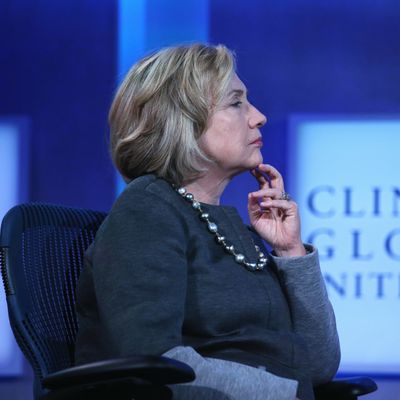
Earlier this week, the New York Times teased the forthcoming book Clinton Cash, in which conservative author Peter Schweizer alleges that foreign entities made donations to the Clinton Foundation in exchange for favors from Hillary Clinton’s State Department. Several news outlets, including the Times, received early access to the book to fuel their own reporting on the subject, and Senator Rand Paul declared that the revelations would be “alarming” and “mind boggling.”
The first round of those reports was published on Wednesday, and so far Paul was right — but not in the way he intended. Sifting through the connections between foreign CEOs’ business dealings, foundation donations that were only partially disclosed, speaking fees collected by Bill Clinton, and decisions made by the former secretary of State is certainly “mind boggling,” but so far there’s no smoking gun.
The biggest revelation so far concerns the sale of one of the United States’ largest uranium mines to Russia’s state atomic energy agency, Rosatom. The Wyoming mine — which could produce as much as half of the U.S. uranium supply this year, according to The Wall Street Journal — was formerly owned by the Canadian company Uranium One, but from 2009 to 2013 the Russians took control of the company. Because the $610 million sale could have national security implications for the U.S., it had to be approved by a federal committee composed of several government agencies. Here’s how the Clintons were involved: Hillary’s State Department was one of the agencies that approved the deal in 2010, and the New York Times reports that during that time Uranium One’s chairman, Ian Telfer, made four donations to the Clinton Foundation via his family foundation, totaling $2.35 million. Despite the Clintons’ agreement with the Obama administration, those donations were not disclosed.
While that sounds fishy, so far there’s no evidence that the donations affected the deal’s approval. In addition to the secretary of State, the Committee on Foreign Investment in the United States (CFIUS) includes the attorney general and the secretaries of the Treasury, Defense, Homeland Security, Commerce, and Energy. It’s also possible that the decision was made by deputies or assistant secretaries in those agencies, not the cabinet members themselves. The Clinton campaign provided a statement from a former assistant secretary of State who said Clinton “never intervened” while he was handling CFIUS matters. Telfer said he made the donations to support his business partner, the Canadian mining executive Frank Giustra, and “the donations started before there was any idea of this takeover.”
Speaking of Giustra, Politico reports that he’s the subject of another tale from Clinton Cash. Giustra sits on the Clinton Foundation’s board, has pledged more than $100 million to the foundation, and cofounded the Clinton Giustra Enterprise Partnership. The chapter “Rainforest Riches” reportedly details Giustra’s close relationship with Bill Clinton and notes that he benefited from the secretary of State’s support of a 2011 free trade agreement with Colombia.
Hillary Clinton spokesman Brian Fallon said that’s among the “most laughable” theories in the book, since Giustra donated to the foundation prior to 2008, but during the primary both she and Obama opposed the deal. “Her support for the deal came only after she joined the Obama administration, when key worker protections were added to the package,” Fallon said. “By that point, the agreement was an administration-wide priority, and then-Secretary Clinton’s statements in support of the deal reflected the administration’s position.”
A source with “knowledge of the Clinton Foundation’s fund-raising operation” confirmed the obvious to the Times: Many donors are giving to the Clinton Foundation because they hope the money will advance their cause. “Why do you think they are doing it — because they love them?” the source quipped. But that doesn’t necessarily mean that they were successful in their efforts to influence the Clintons. If the early reports are any indication, untangling the former (and possibly future) first couple’s professional and charity work is going to be an arduous task for journalists, and the findings may test the limits of America’s interest in Clinton scandals.






























